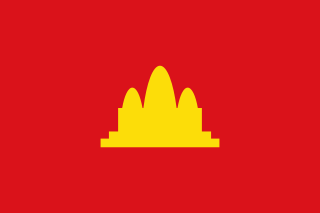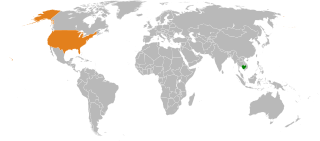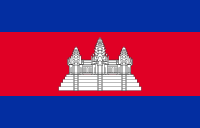
The Khmer Rouge is the name that was popularly given to members of the Communist Party of Kampuchea (CPK) and by extension to the regime through which the CPK ruled Cambodia between 1975 and 1979. The name was coined in the 1960s by then Chief of State Norodom Sihanouk to describe his country's heterogeneous, communist-led dissidents, with whom he allied after his 1970 overthrow.

Pol Pot was a Cambodian revolutionary, dictator, and politician who ruled Cambodia as Prime Minister of Democratic Kampuchea between 1976 and 1979. Ideologically a communist and a Khmer ethnonationalist, he was a leading member of Cambodia's communist movement, the Khmer Rouge, from 1963 to 1997 and served as General Secretary of the Communist Party of Kampuchea from 1963 to 1981. His administration converted Cambodia into a one-party communist state and perpetrated the Cambodian genocide.

Norodom Sihanouk was a Cambodian statesman, Sangkum and FUNCINPEC politician, film director, and composer who led Cambodia in various capacities throughout his long career, most often as both King and Prime Minister of Cambodia. In Cambodia, he is known as Samdech Euv. During his lifetime, Cambodia was under various regimes, from French colonial rule, a Japanese puppet state (1945), an independent kingdom (1953–1970), a military republic (1970–1975), the Khmer Rouge regime (1975–1979), a Vietnamese-backed communist regime (1979–1989), a transitional communist regime (1989–1993) to eventually another kingdom.

The Party of Democratic Kampuchea was a political party in Cambodia, formed as a continuation of the Communist Party of Kampuchea in December 1981. In the mid-1980s, it publicly claimed that its ideology was "a new form of democratic socialism", having ostensibly renounced Marxism–Leninism.

After the fall of the Pol Pot regime of Democratic Kampuchea, Cambodia was under Vietnamese occupation and a pro-Hanoi government, the People's Republic of Kampuchea, was established. A civil war raged during the 1980s opposing the government's Kampuchean People's Revolutionary Armed Forces against the Coalition Government of Democratic Kampuchea, a government in exile composed of three Cambodian political factions: Prince Norodom Sihanouk's FUNCINPEC party, the Party of Democratic Kampuchea and the Khmer People's National Liberation Front (KPNLF).

The Cambodian People's Party (CPP) is a Cambodian political party which has ruled the country since 1979. Founded in 1951, it was originally known as the Kampuchean People's Revolutionary Party (KPRP).

The Candlelight Party is a liberal party in Cambodia. The party was a member of the Council of Asian Liberals and Democrats, Liberal International, and the Alliance of Democrats. It is the largest opposition party in Cambodia, and the main challenger to the ruling Cambodian People's Party. The party, which would have been the only competitive opposition party to the CPP, was disqualified from running in the 2023 election by the National Election Committee despite previously being permitted to participate in the 2022 local elections. The party resumed political activity in October 2021 after having been inactive since 2012.
Cambodia is a one-party dominant state with the Cambodian People's Party in power. Cambodia's legislature is chosen through a national election. The general election is held every five years in the fourth Sunday of July. The Parliament of Cambodia has two chambers. The National Assembly has 125 members, each elected for a five-year term by proportional representation. The Senate has 62 members, mostly indirectly elected.

Sam Rainsy is a Cambodian activist, economist and politician who most recently served as the Leader of the Opposition. He is now the interim leader of the Cambodia National Rescue Party due to the continued ban on political activity by the party's leader, Kem Sokha.

The Coalition Government of Democratic Kampuchea, renamed in 1990 to the National Government of Cambodia, was a coalition government in exile composed of three Cambodian political factions, namely Prince Norodom Sihanouk's FUNCINPEC party, the Party of Democratic Kampuchea and the Khmer People's National Liberation Front (KPNLF) formed in 1982, broadening the de facto deposed Democratic Kampuchea regime. For most of its existence, it was the internationally recognized government of Cambodia.

Kem Sokha is a Cambodian politician and activist who most recently served as the President of the Cambodia National Rescue Party (CNRP). He served as the Minority Leader, the highest-ranking opposition parliamentarian, of the National Assembly from December 2016 to January 2017, and previously as the First Vice President of the National Assembly from August 2014 to October 2015. He represented Kampong Cham as its Member of Parliament (MP) from 2008 to 2017. From 2007 to 2012, Kem was the leader of the Human Rights Party, which he founded.

The People's Republic of Kampuchea (PRK) was a partially recognised state in Southeast Asia which existed from 1979 to 1989. It was a client state of Vietnam, founded in Cambodia by the Vietnamese-backed Kampuchean United Front for National Salvation, a group of Cambodian communists who were dissatisfied with the Khmer Rouge due to its oppressive rule and defected from it after the overthrow of Democratic Kampuchea, Pol Pot's government. Brought about by an invasion from Vietnam, which routed the Khmer Rouge armies, it had Vietnam and the Soviet Union as its main allies.

Bilateral relations between the United States and Cambodia, while strained throughout the Cold War, have strengthened considerably in modern times. The U.S. supports efforts in Cambodia to combat terrorism, build democratic institutions, promote human rights, foster economic development, eliminate corruption.
The Democratic Party, commonly referred to as The Democrats, was a left-wing pro-independence political party formed in 1946 by Prince Sisowath Youtevong, who had previously been a member of the French Section of the Workers' International. It was the sole dominant party in Cambodia from 1946 until the creation of Sangkum in 1955.
The Cambodian National Unity Party was a political party set up by the Khmer Rouge on November 30, 1992 during the United Nations Transitional Authority in Cambodia to participate in the elections that year. The party was led by Khieu Samphan and Son Sen. It succeeded the Party of Democratic Kampuchea after 1993. As with the PDK, the National Army of Democratic Kampuchea was said to be its armed wing. Its professed aim at its founding was to "work towards implementing multi-party liberal democracy." Its radio station was known as the Voice of the Great National Union Front of Cambodia until being replaced in July 1994 by PGNUNSC Radio.

General elections were held in Cambodia on 28 July 2013. The National Election Committee (NEC) announced that some 9.67 million Cambodians were eligible to cast their ballots to elect the 123-seat National Assembly. Voter turnout was reported to be 69.6%, a record low for a general election. Polling precincts opened 7:00 a.m. and closed at 3:00 p.m. The Cambodian Minister of Information, Khieu Kanharith announced in preliminary results that the Cambodian People's Party won 68 seats and the opposition Cambodia National Rescue Party won all the remaining 55 seats. This election marked the largest seat loss by the Cambodian People's Party to date, and their lowest share of seats since 1998.

The Cambodia National Rescue Party was a major political party in Cambodia. It was founded in 2012 as a merger between the Sam Rainsy Party and Human Rights Party.

The Communist Party of Kampuchea (CPK), also known as the Khmer Communist Party, was a communist party in Cambodia. Its leader was Pol Pot and its members were generally known as the Khmer Rouge. Originally founded in 1951, the party was split into pro-Chinese and pro-Soviet factions as a result of the Sino–Soviet split with the former being the Pol Pot faction, and the latter adopting a more revisionist approach to Marxism. As such, it claimed that 30 September 1960 was its founding date, then it was named the Workers' Party of Kampuchea before it was renamed the Communist Party in 1966.

The Grassroots Democratic Party is an independent political party based in Phnom Penh, Cambodia. It is headed by its chairman Sek Sokha, Yeng Virak as party president and Vay Lundy as secretary-general. The party is one of the candidates in the 2018 Cambodian parliamentary election of the National Assembly.

Communal elections were held in Cambodia on 5 June 2022. It was the fifth quinquennial communal election in Cambodia since 2002. 1,652 communes in all 25 provinces of Cambodia were contested for a total of 11,622 commune council seats. The election precedes the 2023 general election and the 2024 Senate election. 9.2 million of 10.5 million eligible voters were registered to cast their ballots. Voter turnout was 80.3%.
















